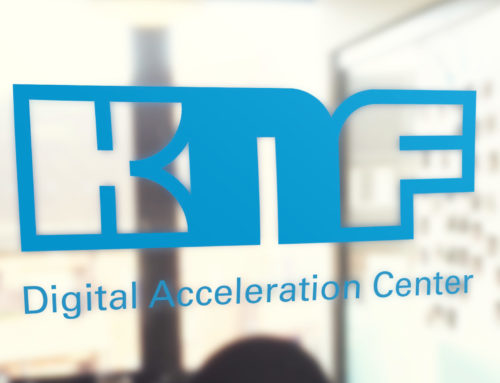How to become a digital pioneer among mid-sized companies
One of the main arguments I presented during my keynote speech at the ELO Digital Office conference was the following: “More digital self-confidence!“ In front of an audience of about 700 people, many of them executives or owners of mid-sized companies, the subject at hand was the opportunities that going digital provides to businesses. The process of digital transformation provides a positive outlook in two respects: First of all, it provides the opportunity to increase efficiency and thus yield a higher level of productivity utilizing fewer resources. But mostly, it offers a chance to develop innovative business portfolios, which in turn translates into new and significantly improved products.
The mid-sized sector neglects digitization
In my opinion, it comes as no surprise that mid-sized companies especially often struggle with going digital. At first glance, it should be easier for the mid-sized sector, since these companies – unlike larger corporations – aren’t stifled by extensive micro-politics and the safeguarding of incumbent divisional privileges. But a study on medium-sized business initiatives carried out by Commerzbank in 2015 shows that it is the mid-sized sector in particular that neglects to go digital – and this is despite the fact that 86 percent of the 4,000 executives interviewed stated that they believe in the opportunities digitization has to offer.
Just short of two-thirds of all executives interviewed indicated that they were involved in markets with mature products and services, which are characterized by strong predatory competition and increasingly shorter innovation cycles. Based on these findings however, most entrepreneurs come to the conclusion that going digital should be used primarily to reduce cost and increase efficiency and less for the development of innovations or the opening up of new distribution channels. Well. There is nothing that speaks against utilizing digital technologies in order to minimize cost, but this approach in and of itself is too short-sighted.
If in the last months and years Angelique Kerber had taken the approach to become as good a tennis player as possible with as little training as possible, then she might be an okay tennis player today. But in order to win a Grand Slam tournament you have to take a different approach, which could be summarized as follows: “My objective is to make it big. I want to go all out in my attacks and create a real stir at all the big tournaments. I think I’m ready to for the big win.” And after they had won the semi-finals handball goalkeeper Andreas Wolff stated: “I came here to become the new European Champion!“
It is in our hands
So what do niche market leaders need to do today, in order to not miss out on the digitization movement? Not every technology company can develop self-driving cars – but: almost 90 percent of all innovations worldwide are products and services connected to the digital world. Many a person gets quite nervous when thinking about it. My keynote speech and resulting subsequent discussions will have a similar effect. Because for many of you the main focus is rooted in a completely different premise nowadays, which claims that going digital in industrialized nations will cost millions of jobs globally – McKinsey states that, based on a recent study, in the insurance sector alone just under 30 percent of all operational business will be lost over the next 10 years. It is my opinion though that we fail to consider one important factor primarily: We are talking about a phenomenon that spans the globe, which obviously will not impact all regions equally. And it is in our own hands, whether we are among the global winners or losers of this development! Just like with tennis or handball players.
What sets digital pioneers apart
In other words: The danger of not participating in the digitization movement by not driving innovation is much greater than the danger posed by digitization itself. This requires courage and self-confidence – particularly in the mid-sector. “Innovations are mostly a brain matter and not so much a matter of resources,” states Markus Beumer, managing director at Commerzbank, who is responsible for all mid-sector business, “It takes courage to try new things, rethink matters and thereby take the risk to upset the apple cart.” And that’s why I consider it especially fascinating to learn what sets apart the digital pioneers from the rest of the mid-sized companies according to the Commerzbank study:
1. They launch pilot projects (28 percent more frequently than the average company).
2. They analyze their own potential instead of merely taking their cues from current market conditions (26 percent more frequently than the average company).
3. They allow for creative freedom (25 percent more frequently than the average company).
4. They hire technical subject matter experts (24 percent more frequently than the average company).
In summary, the main argument of my keynote speech that “more digital self-confidence” is necessary proves to be correct. “Digital pioneers don’t wait. They focus on innovations and on trying new things, in order to get ahead in a tight market,” which is also how Beumer summarizes the success factors of digital pioneers. Drawing on my experience, I would like to add the following characteristics to the list:
5. This is a subject of the utmost priority and is discussed at management level.
6. They have at their disposal a network of salaried and freelance subject matter experts.
These last two points are important, because in order to allow for creative freedom, some fundamental traits such as high tolerance for errors, candor and curiosity have to be present in all players. The Internet operates based on the principles of interconnectedness, candor, participation and agility (German acronym: VOPA). In order to embrace these principles, mid-sector companies can often times not solely rely on already established professionals, and they don’t even need to. Whoever gets his employees up to speed digitally-speaking and allows for creative freedom at all levels, whoever invests in pilot projects and gets necessary teams on board, will not have to fearfully cling to the security of mature products and services. On the contrary: He will be ahead of the game.
Your company needs know-how? Click here to check out the Digital Leadership Academy.
And: Our network is your support. You are looking for digital minds? We know them for sure! Feel free to contact us!






